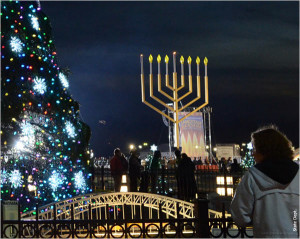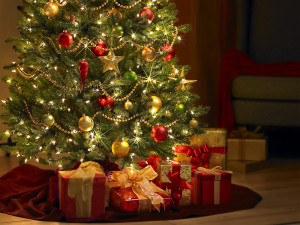 Historically, Jews have been actively influenced by the cultures in which we have lived. We learn and borrow from the cultures we live along side. Often our holidays are influenced by these civilizations. Today in the United States we also have the opportunity to take part in national celebrations as full-fledged Americans. How do we, as modern American Jews, engage in rituals that bind Americans together? How do we participate without risking our identity? We have done it with Thanksgiving, but can we do it with Christmas?
Historically, Jews have been actively influenced by the cultures in which we have lived. We learn and borrow from the cultures we live along side. Often our holidays are influenced by these civilizations. Today in the United States we also have the opportunity to take part in national celebrations as full-fledged Americans. How do we, as modern American Jews, engage in rituals that bind Americans together? How do we participate without risking our identity? We have done it with Thanksgiving, but can we do it with Christmas?
There are now effectively two Christmases in the United States. There is Traditional Christmas and there is American Christmas. Traditional Christmas is the religious celebration of the birth of Christ. It is an event with deep meaning for those of the Christian faith. The themes of Divine Love, Peace on Earth and Goodwill are universal values at the core of this deeply religious and holy holiday.
Traditional Christmas is properly the purview of Christians. We cannot presume to enter that space, only respectfully watch from the outside. However, secular American Christmas has become a quintessentially American holiday. It has been reframed and modified into an earthly and commercial season that traditionally started with Santa arriving in front of Macy’s during the Macy’s Thanksgiving Day Parade and continuing with other markers including the major retail events known as Black Friday and Cyber Monday.
American Christmas is a secular event that builds on the values of Traditional Christmas but has been reimagined through a secular and highly commercialized lens. Stripped of its religious elements, American Christmas embraces the joy and other positive emotions of the holiday. Christmas Trees, festive lights and decorations, Rockefeller Center, the windows of Lord & Taylor, Rudolf, Santa Claus, Burl Ives, Irving Berlin, Christmas Songs of all kinds. The list goes on and on.
American Christmas is a time for good cheer, holiday parties, gift giving, family gathering, tree decorating. It has greatly influenced and elevated our celebration of Chanukah. A message of goodwill towards all, peace and love still underlies the season. The promotion of these universal values is something we might actively embrace. Interestingly, we already do it from the other side.
Chanukah has become one of the most popular celebrated Jewish holidays. This is in response to the overwhelming presence of Christmas but also because we have actively promoted Chanukah as part of the American landscape. There is hardly a public square that does not contain a large menorah. Chabad is ubiquitous, lighting the Chanukiah across America from the Washington Mall to the Suburban Square Shopping Center on the Main Line in Philadelphia. Dreidels and Latkes have become part of the American consciousness. Chanukah is promoted as a proclamation of Judaism as a public good, espousing universal values for all to embrace. As we have given the gift of Chanukah to America, can we accept the gift of American Christmas?
We claim to be a nation that shuns the boundaries that separate us. Our millennial generation has embraced that message. And they have an important point, for we can maintain our identity while sharing with others. Opportunities to bring us together as a human family are too few and deeply needed. We often find ourselves separated from others by fears and prejudices that could and should be set aside. Sharing the universal messages of American Christmas with our fellow citizens might be an opportunity to build bridges that deepen our relationships. For our sake let’s celebrate and embrace the holiday season.
Happy Holidays, Chag Sameach and Merry Christmas!
